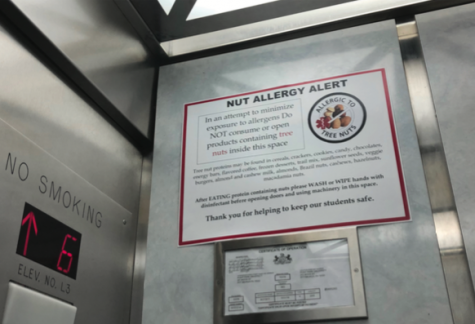Tree nut allergy signs in Lawrence Hall explained
New posters remind students to be mindful of their peers’ allergies
September 25, 2019

“NUT ALLERGY ALERT” signs have been posted in all elevators and lobby of Lawrence Hall.
This semester, the university displays tree nut allergy signs in Lawrence Hall to encourage students to be mindful of those with severe tree nut allergies.
In bold lettering, “NUT ALLERGY ALERT” title the signs followed by a boxed description that reads: “In an attempt to minimize exposure to allergens DO NOT consume or open products containing tree nuts inside this space.” Located at the bottom are examples of foods containing tree nuts as well as a reminder for students to wash or wipe hands with disinfectant before opening doors and using machinery.
Dean of Students and Vice President of Student Affairs, Keith Paylo, expressed what he hopes these signs will accomplish.
“The goal of the signs is to create awareness for a situation that has become more prevalent over the last few years than ever before,” Paylo said. “There are a number of students with various allergies, some more serious than others, and the signs serve as a reminder to our students to please be sensitive to these allergies when they are consuming such items as tree nuts.”
While these signs are designed to protect all students with tree nut allergies, the parents of Coral Dennison, a freshman dance major, initially pushed for them to be posted.
Dennison is not able to eat or physically be around tree nuts, and she said past experiences with the doctor caused her family concern.
“We stopped counting after 25 hospital visits,” Dennison said.
For students like Dennison who cannot eat or be near tree nuts, Point Park’s CulinArt staff has revamped their menu. Clint Shearer, campus chef at Point Park University, reveals new food changes in the dining hall.
“Some of our desserts and baked goods that we used to order included nuts, such as carrot cake. So, we have just completely eliminated all those kinds of desserts,” Shearer said. “We also used to have pecans included in our oatmeal bar that we have removed as well. We have taken nuts out to give people peace of mind.”
A common mistake is associating tree nuts with peanuts. Tree nuts grow on trees, while peanuts grow underground and are part of a different plant family, known as legumes. Examples of legumes include beans, peas, lentils and soybeans. If severely allergic to either of these types of nuts, anaphylaxis is a risk. According to the Center for Disease Control (CDC), anaphylaxis is a severe allergic reaction that is rapid in onset and may cause death.
Marilyn E. Zrust, a registered nurse at Point Park University, said the symptoms of this allergic reaction are easily noticeable.
“People who can’t be around tree nuts at all are going to have the inability to breathe, tightening of the throat, and ultimately death if not treated in time,” Zrust said. “Carry your EpiPen at all times, read food labels, and wear a medical alert identification bracelet or necklace to remind people of your severe allergies.”
Dennison knows from personal experience how important it is to always be prepared.
“A lot of stuff happens at the spur of the moment, so I always have to make sure I have the EpiPen,” Dennison said. “If something does happen, even if it’s just going upstairs, that could be enough time to make the difference between whether I make it or not.”



















